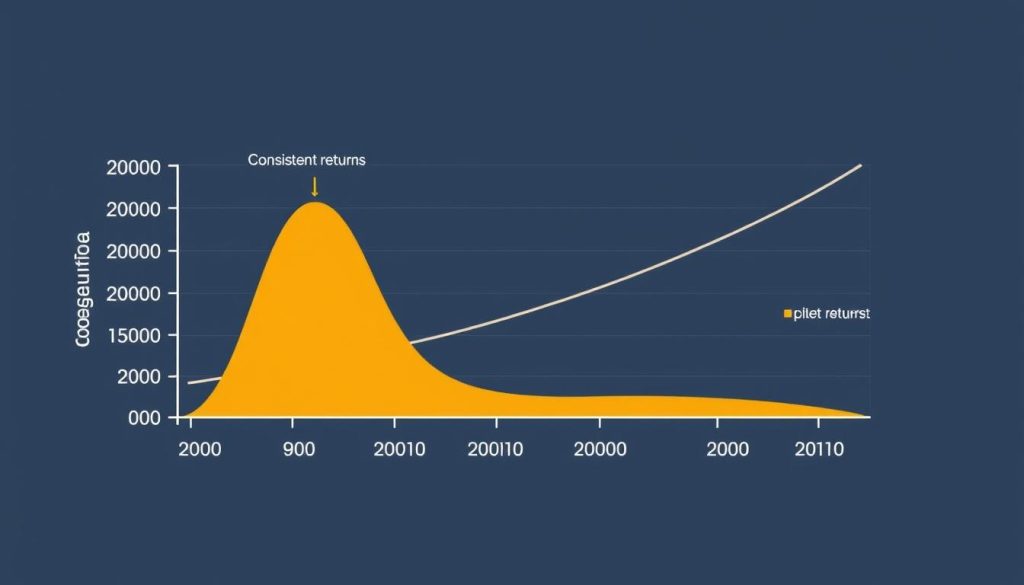As an independent professional in France’s evolving gig economy, achieving income security is a critical challenge. Without traditional employment protections, freelancers and independent workers face unique financial risks.
Navigating economic uncertainties and market fluctuations requires a deep understanding of financial stability and the ability to build resilience against income volatility.
This comprehensive guide provides practical strategies for maintaining professional independence while ensuring security for people who work independently. We’ll explore the fundamental concepts and opportunities that independent professionals face when creating sustainable income streams in the French context.
Table of Contents
Key Takeaways
- Understanding the challenges of income security for independent professionals
- Practical strategies for building financial resilience
- Opportunities for creating sustainable income streams
- The importance of financial stability in the gig economy
- Navigating economic uncertainties as an independent professional
The Fundamentals of Income Security for Freelancers
Income security is a cornerstone for freelancers, enabling them to manage their finances effectively and maintain a stable lifestyle. The concept of income security is multifaceted, particularly for independent professionals who lack traditional employment benefits. As a freelancer, having a reliable income stream is crucial for meeting both personal and business needs without constant financial stress.
Defining Financial Stability in Independent Work
Financial stability for independent professionals means having sufficient, reliable income to meet both personal and business needs. This involves strategic planning for consistent cash flow, emergency reserves, and long-term financial health. Unlike traditional employment, freelance work requires creating your own financial safety nets.
The Importance of Predictable Income Streams
Predictable income streams form the foundation of financial stability, allowing independent professionals to plan effectively and make confident business decisions. Establishing income security often requires a multi-faceted approach combining client management, diverse revenue streams, and strategic financial planning. The French government provides certain protections for independent workers, though these differ significantly from traditional employment benefits.
Unique Financial Challenges Independent Professionals Face
The financial landscape for independent professionals is fraught with challenges that are not typically faced by those in traditional employment. These challenges underscore the need for proactive financial management strategies.
Income Volatility and Unpredictability
Many independent professionals experience irregular income patterns, making financial planning exceptionally challenging. The feast-or-famine cycle is common, with periods of abundant work followed by dry spells that test financial reserves.
- Client payment delays and non-payment risks create additional cash flow challenges.
- Market fluctuations and economic downturns often impact independent professionals first.
Lack of Traditional Employment Benefits
Without employer-provided benefits, independent workers must self-fund healthcare, retirement, and other protections. This adds complexity to their financial planning, highlighting the importance of tailored financial strategies.
Assessing Your Income Security Needs
To achieve financial stability, independent professionals must first assess their income security needs. This involves understanding both personal and business financial requirements to create a comprehensive financial framework.
Calculating Your Minimum Viable Income
Calculating your minimum viable income requires a thorough assessment of both personal and business expenses. This includes fixed costs like housing and insurance, variable expenses, business overhead, taxes, and retirement contributions.
- Fixed costs: housing, insurance, utilities
- Variable expenses and business overhead
- Taxes and retirement contributions
| Expense Category | Monthly Cost |
|---|---|
| Housing | $1,500 |
| Utilities | $200 |
| Business Overhead | $800 |
Determining Your Financial Safety Net Requirements
Determining your financial safety net requirements involves analyzing your business cycle, client payment patterns, and industry volatility. Most experts recommend maintaining 6-12 months of expenses in emergency savings.
Understanding your true income needs helps establish clear pricing strategies and minimum acceptable rates for your services, ensuring a balance between financial security and work quality.
Building a Stable Client Base in France

A stable client base is the foundation upon which independent professionals in France can build a secure financial future. This stability is achieved through strategic client relationships that provide predictable income streams.
Diversifying Your Client Portfolio
Diversification is key to maintaining stability. By spreading your client base across multiple industries, you protect yourself against sector-specific downturns that could devastate your income. A balanced portfolio should include a mix of high-value clients and reliable smaller clients to avoid dependency on any single revenue source.
Establishing Retainer Agreements
Retainer agreements and long-term contracts are essential for creating predictable monthly income. These agreements allow you to plan your finances effectively while still pursuing additional project-based work. By building strong client relationships based on exceptional value delivery, you increase retention rates and reduce the pressure to constantly acquire new clients.
| Client Type | Benefits | Stability Factor |
|---|---|---|
| High-Value Clients | Significant revenue, potential for long-term contracts | High |
| Reliable Smaller Clients | Consistent income, diversified portfolio | Medium |
| Retainer Agreements | Predictable income, financial planning stability | High |
Creating Multiple Revenue Streams for Income Security
Independent professionals can enhance their income security by developing multiple revenue streams. This strategic approach reduces dependency on any single income source, providing financial resilience in an unpredictable market.
Earning Without Direct Time-for-Money Exchanges
Passive income opportunities allow independent professionals to earn money without directly trading time for money, creating scalability beyond billable hours. Examples include:
- Digital products such as templates, guides, courses, or software tools that generate ongoing revenue.
- Affiliate partnerships related to your expertise.
- Licensing your intellectual property or methodologies.
These passive income streams can complement your core services, enhancing overall income security.
Standardizing Services for Predictable Income
Productizing your services through standardized packages with clear deliverables and pricing improves efficiency while making your offerings more accessible to clients. This approach can lead to predictable monthly income through subscription-based service models.
| Revenue Stream | Description | Benefits |
|---|---|---|
| Digital Products | Templates, guides, courses, software tools | Ongoing revenue, scalability |
| Affiliate Partnerships | Promoting related products or services | Complementary income, minimal time investment |
| Licensing IP | Licensing intellectual property or methodologies | Royalty payments, broad reach |
Emergency Fund Strategies for Irregular Income Patterns
For independent professionals, building a robust emergency fund is key to ensuring income security and navigating the uncertainties of irregular income patterns. Unlike traditional employees, freelancers face unique financial challenges that require tailored strategies.
Understanding your business cycle is crucial in determining the appropriate size of your emergency fund. Analyzing your income history to identify seasonal patterns or cyclical downturns helps in setting realistic savings targets.
How Much to Save Based on Your Business Cycle
Your emergency fund size should be based on your specific business needs, with longer client acquisition periods necessitating larger reserves. Typically, covering 3-6 months of expenses is recommended.
- Assess your income volatility to determine your savings needs.
- Consider your business cycle when deciding on the fund size.
Optimal Financial Vehicles for Emergency Funds
Segmenting your emergency fund into tiers with different accessibility and yield characteristics can balance liquidity needs with protection against inflation. French financial institutions offer suitable options, such as Livret A accounts, which provide tax advantages and reasonable accessibility.
- Immediate-access funds should cover 1-2 months of expenses.
- Secondary reserves can be held in higher-yield vehicles with modest access delays.
French Social Protection Systems for Independent Workers
Understanding the French social protection system is crucial for independent professionals to navigate the various benefits and programs available to them.
Key Benefits for Independent Workers
The French social protection system offers specific programs for independent workers, including health insurance coverage, family benefits, and disability protection. The Régime Social des Indépendants (RSI) provides social security benefits, although its recent integration into the general social security system has brought changes.
- Mandatory health insurance coverage with contribution rates based on income levels
- Family benefits, including childcare support and family allowances
- Maternity and paternity benefits, with payment calculations differing from the employee system
- Disability coverage providing essential protection against income loss
Accessing Unemployment Support
Recent reforms have expanded unemployment protections to independent workers through the Allocation des Travailleurs Indépendants (ATI). However, navigating these systems often requires professional assistance, particularly for foreign professionals.
| Benefit | Description | Eligibility |
|---|---|---|
| Health Insurance | Mandatory coverage with income-based contributions | All independent professionals |
| Family Benefits | Childcare support and family allowances | Independent workers with families |
| Disability Coverage | Protection against income loss due to illness or injury | Independent professionals with varying business structures |
Fixed-Income Securities as Stability Tools
In the pursuit of financial stability, independent professionals can benefit from incorporating fixed-income securities into their investment portfolios. These securities provide regular income and relatively low risk, making them an attractive option for those seeking predictable returns.

Government and Corporate Bonds for Steady Returns
Government bonds, such as French OATs, offer lower returns with maximum security, while corporate bonds provide higher yields with corresponding increases in risk. Careful selection based on credit ratings is crucial. Government bonds are generally considered low-risk, making them suitable for emergency funds.
Certificates of Deposit and Treasury Securities
Certificates of Deposit (CDs) and Treasury securities lock in interest rates for specific periods, creating predictable returns. CDs can be laddered to balance access and yield, while Treasury securities offer diversification options with different risk profiles. Understanding the inverse relationship between interest rates and bond prices is key to managing risk.
Essential Insurance Policies for Income Protection

As independent professionals in France navigate their careers, they face unique financial risks that can impact their income stability. Essential insurance policies form a critical component of income security by protecting against catastrophic financial losses that could otherwise devastate your business.
Health and Disability Insurance Options
Health insurance is mandatory in France, with the basic state system (Assurance Maladie) providing essential coverage. Most independent professionals supplement this with complementary private insurance to ensure comprehensive health coverage. Disability insurance is also crucial as it provides financial support in case of an inability to work, thereby protecting your income stream.
Professional Liability and Business Interruption Coverage
Professional liability insurance (Responsabilité Civile Professionnelle) is vital for protecting against claims arising from errors or omissions in your professional services. Additionally, business interruption insurance can provide crucial income replacement if external events prevent you from operating your business. For more detailed information on insurance policies for consultants, you can visit this resource.
Other important insurance options include cyber liability insurance, which becomes increasingly important as more independent professionals conduct business digitally, and property insurance, which protects business equipment and workspace. The French insurance market offers specialized policies for independent professionals that bundle relevant coverages at competitive rates. Regular insurance reviews are essential as your business evolves, ensuring appropriate coverage levels that balance protection with premium costs.
Strategic Tax Planning for French Independent Professionals
As a French independent professional, navigating the complexities of tax planning is crucial for maintaining financial stability. Strategic tax planning is not about aggressive tax avoidance but rather understanding the available mechanisms to legally optimize your tax position. This involves being aware of the different tax implications of various business structures and utilizing tax-advantaged savings vehicles.
French Tax Considerations for Different Business Structures
Different business structures, such as auto-entrepreneur, EIRL, EURL, and SASU, have significant tax implications that should influence your choice based on income levels and business activities. For instance, understanding the tax rates and social charges associated with each structure can help you make an informed decision. The French tax system includes numerous deductions specifically available to independent professionals that can substantially reduce taxable income when properly documented.
Tax-Advantaged Savings and Investment Accounts
Utilizing tax-advantaged savings vehicles like the Plan d’Épargne Retraite (PER) allows independent professionals to simultaneously prepare for retirement while reducing current tax obligations. Understanding VAT (TVA) thresholds and requirements is also essential, as crossing certain revenue thresholds triggers mandatory VAT registration and compliance. Working with a tax professional who specializes in independent professionals can provide day-to-day guidance and identify optimization opportunities specific to your situation.
By integrating tax planning into your overall financial strategy, you can ensure a more stable financial future. This approach, rather than treating tax planning as a separate annual exercise, enables you to make informed decisions that impact your employment and financial well-being.
Self-Funded Retirement Planning Without Employer Benefits
Independent workers must take charge of their retirement savings, navigating a complex landscape to achieve financial stability in their later years. Unlike traditional employees, independents don’t have access to employer-sponsored retirement plans, making personal initiative crucial.
French Pension System Options for Independents
The French pension system includes mandatory contributions for independent workers, providing a baseline for retirement income. Understanding how your business structure affects these contributions is essential for maximizing your benefits.
- Mandatory pension contributions are part of the French system for independents.
- Benefits typically offer baseline retirement income security.
Supplementary Retirement Investment Strategies
To supplement the state pension, independent professionals can utilize vehicles like the PER (Plan d’Épargne Retraite), which offers tax advantages to encourage retirement savings. Diversifying your retirement portfolio with such options can enhance your financial security.
- Supplementary retirement vehicles like PER offer tax benefits.
- Calculating retirement needs involves projecting future expenses and inflation.
- Investment strategies should evolve with decreasing risk tolerance as retirement approaches.
By combining mandatory pension contributions with supplementary retirement strategies, independent professionals in France can build a robust financial foundation for their retirement years.
Managing Debt While Maintaining Income Security

Effective debt management is crucial for independent professionals to maintain income security. As part of their financial strategy, independent professionals must distinguish between productive debt that generates returns and consumer debt that creates financial drag.
Strategic Approaches to Business and Personal Debt
Strategic debt management involves using business debt to finance income-generating assets or expand capacity with a clear return on investment. Personal debt management is equally important, as personal and business finances often remain intertwined. Independent professionals must adopt a balanced approach to manage both business and personal debt effectively.
Accessing Credit as an Independent Professional in France
French lending institutions have specific requirements for independent professionals seeking credit, often necessitating multiple years of financial statements. Building and maintaining a strong credit profile requires different strategies as an independent professional compared to traditional employees. Specialized programs exist for professionals with established businesses, including mortgage access and lines of credit for managing cash flow variations.
Digital Tools for Financial Management and Forecasting
Digital financial management tools have revolutionized the way independent professionals track, forecast, and optimize their financial positions. These tools have become essential for achieving financial stability in today’s fast-paced business environment.

Budgeting and Cash Flow Forecasting Applications
Specialized budgeting applications for variable income allow for more realistic planning than traditional budgeting methods designed for steady paychecks. Cash flow forecasting tools help anticipate potential shortfalls before they become crises, allowing proactive response rather than reactive scrambling.
Invoicing and Payment Processing Solutions
Modern invoicing platforms streamline the billing process while providing professional documentation and automated follow-up for late payments. Payment processing solutions that reduce friction in client payments can significantly improve cash flow timing and reduce administrative overhead.
By leveraging these digital tools, independent professionals can better manage their finances, reduce errors, and improve consistency in financial management. This enables them to focus on their core business activities and achieve long-term financial stability.
Building Professional Networks for Collaborative Security
Building a robust professional network is crucial for independent professionals seeking collaborative security in France. This network provides a safety net through collaborative opportunities, knowledge sharing, and mutual support systems.
Coworking Spaces in France
French coworking spaces offer more than just physical workspace—they create communities where independent professionals can find collaborators, referral sources, and emotional support. These spaces foster a sense of belonging and provide opportunities for networking and growth.
Industry Associations and Support
Industry associations provide valuable advocacy, continuing education, and networking opportunities specific to your professional field. Support groups focused on independent professionals address the unique challenges of self-employment, offering a platform for sharing experiences and advice.
| Network Type | Benefits | Examples |
|---|---|---|
| Coworking Spaces | Collaborators, Referral Sources, Emotional Support | WeWork, TheDesk |
| Industry Associations | Advocacy, Continuing Education, Networking | Freelance Federation, Professional Services Association |
| Support Groups | Shared Experiences, Advice, Emotional Support | Local Freelance Meetups, Online Forums |
Navigating Economic Downturns and Market Changes
As an independent professional, navigating economic downturns and market changes is crucial for maintaining income security. Economic fluctuations pose significant challenges, requiring proactive strategies to ensure financial stability.
Economic downturns present particular challenges for independent professionals. To mitigate these risks, it’s essential to develop a robust financial foundation. This involves building financial buffers, diversifying your client base, and establishing multiple revenue streams.
Recession-Proofing Your Independent Business
Recession-proofing begins during prosperous periods. By diversifying your client portfolio across industries and establishing retainer agreements, you can reduce your exposure to risk. Understanding how your services are affected by economic cycles helps anticipate potential impacts and develop contingency plans.
- Diversify your client base to reduce dependence on a single industry.
- Establish multiple revenue streams to cushion against financial shocks.
- Regularly review and adjust your pricing strategy to account for inflation and other economic changes.
Adapting Your Services During Financial Crises
During financial crises, it’s crucial to adapt your services to address the changing needs of your clients. This may involve offering more flexible payment terms or scaled service options. By emphasizing the concrete value and ROI your services provide, you can maintain relevance even when budgets tighten. Effective communication is key, focusing on how your services can help clients navigate these challenging times.
By being proactive and adaptable, independent professionals can not only survive economic downturns but also capitalize on new opportunities that arise during these periods.
Conclusion: Developing Your Personalized Income Security Plan
Developing a tailored income security strategy is essential for independent professionals seeking stability. To achieve this, you must integrate various strategies discussed throughout this guide into a coherent approach that suits your specific situation.
Key considerations include:
- Honest assessment of your current financial position and risk tolerance
- Addressing immediate vulnerabilities and long-term objectives through complementary strategies
- Regular review and adjustment of your plan as your business and personal circumstances evolve
By prioritizing implementation steps based on your most significant vulnerabilities and seeking professional guidance, you can create a robust income security plan. This plan should balance protection against downside risks with the flexibility to pursue growth opportunities, ultimately supporting your long-term success in an evolving economy.
FAQ
What are the key factors that contribute to income stability for independent professionals?
Diversifying your client base, establishing retainer agreements, and creating multiple revenue streams can help achieve stability in your incomes.
How can I assess my financial safety net requirements?
To determine your financial safety net needs, calculate your minimum viable income and consider factors like business cycle, expenses, and debt obligations.
What are the benefits of having an emergency fund as an independent professional?
An emergency fund provides a cushion against unpredictable income patterns, allowing you to cover essential expenses during periods of financial stress.
How can I access unemployment support as a freelancer in France?
In France, freelancers can access unemployment support through the relevant social protection systems, such as RSI, by meeting specific eligibility criteria.
What are the advantages of strategic tax planning for independent professionals?
Strategic tax planning can help minimize tax liabilities, optimize savings, and improve overall financial stability by leveraging tax-advantaged accounts and business structures.
How can I recession-proof my independent business?
To recession-proof your business, focus on diversifying your services, building a stable client base, and maintaining a robust financial safety net to mitigate the impact of economic downturns.
What digital tools can help with financial management and forecasting?
Utilize budgeting and cash flow forecasting applications, as well as invoicing and payment processing solutions, to streamline financial management and improve forecasting accuracy.
How can I manage debt while maintaining financial stability?
To manage debt effectively, adopt strategic approaches to business and personal debt, and explore options for accessing credit as an independent professional in France.





